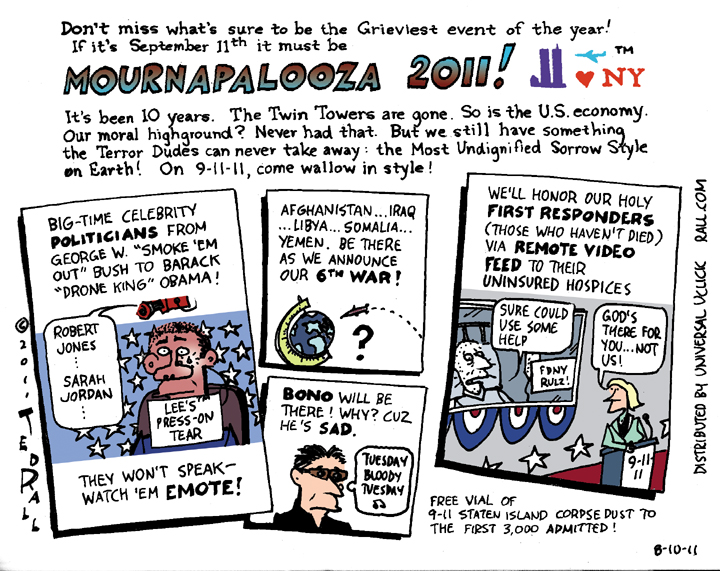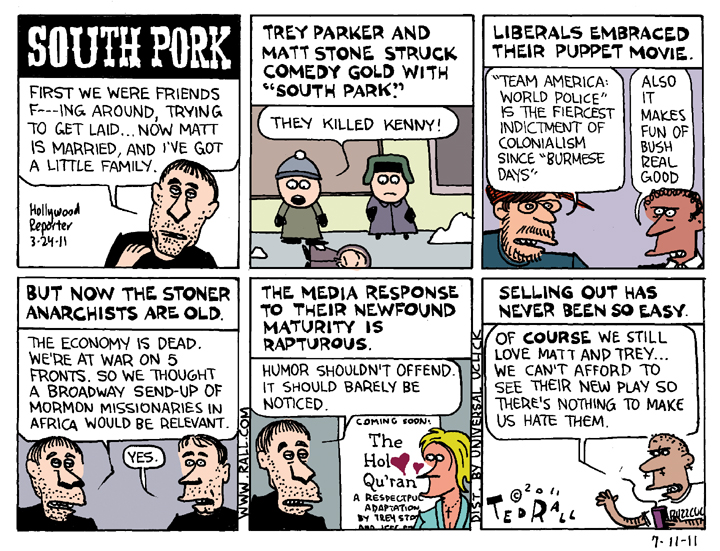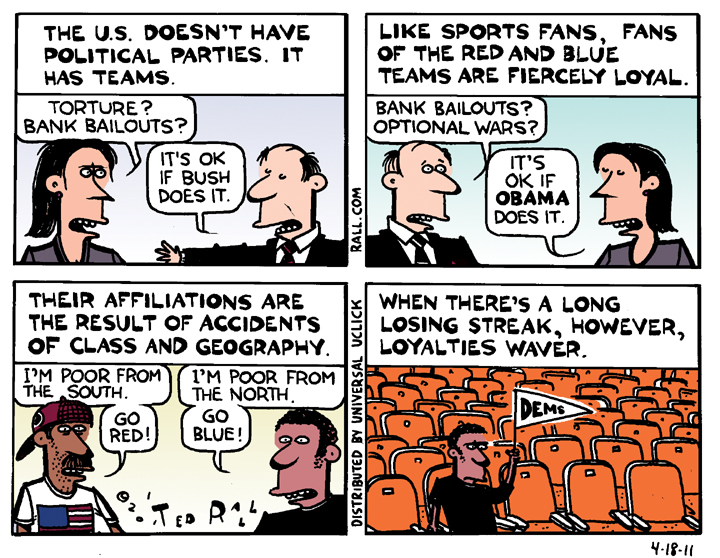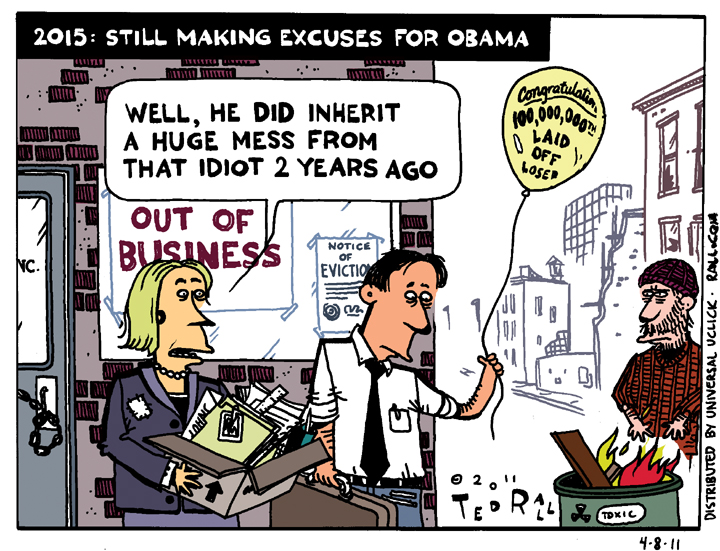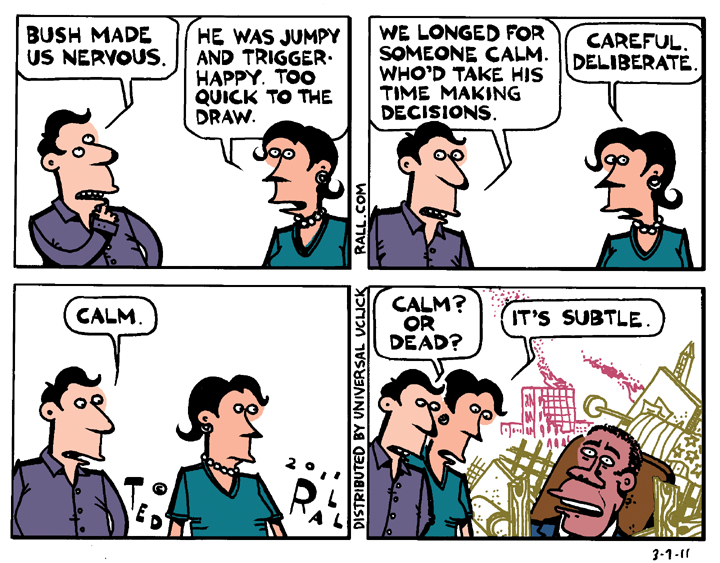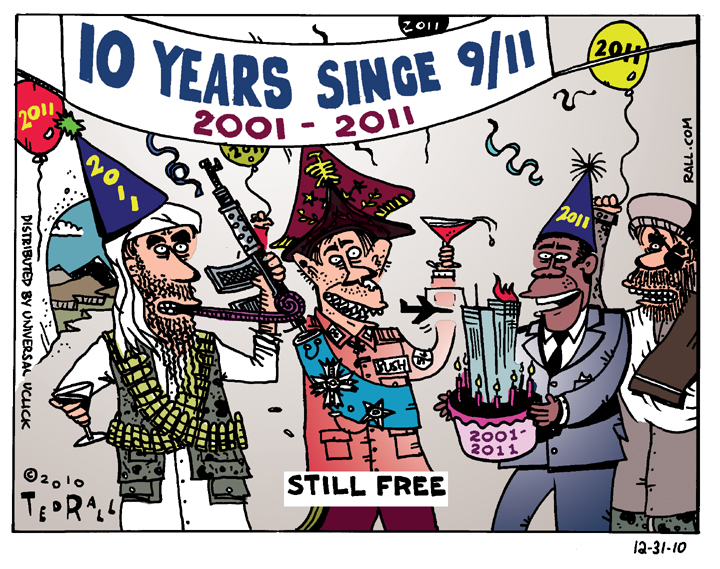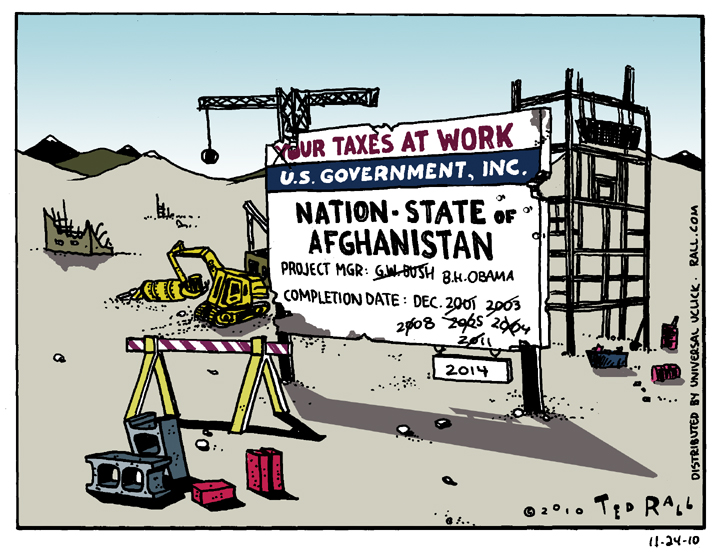America gears up for an event that promises spectacular schmaltz: the 10th anniversary of 9/11.
SYNDICATED COLUMN: Brave New Book
Political Scientist Argues the U.S. is a Police State
The United States is a police state.
Not in danger of becoming one.
Is.
And it’s too late to restore democracy.
That’s the stark message of Andrew Kolin’s brave, lucid and important book “State Power and Democracy: Before and During the Presidency of George W. Bush.”
Kolin comes out swinging like Joe Frazier. Illusions and delusions about America as a democracy, much less one that is benevolent, don’t stand a chance.
The U.S., Kolin says, shares all the major attributes of a Third World police state: a constant state of emergency in which security always trumps civil liberties; sidestepping of laws by the government; excessive secrecy; the use of preventative detention and holding enemies of the state without filing formal charges; the manufacturing of reasons to go to war.
“The expansion of state power over the course of U.S. history came at the expense of democracy,” Kolin begins. “As state power grew, there developed a disconnect between the theory and practice of democracy in the United States. Ever-greater state power meant it became more and more absolute. This resulted in a government that directed its energies and resources toward silencing those who dared question the state’s authority.”
Some will find Kolin’s more-in-sorrow-than-in-anger deadpan delivery disconcerting or depressing. I think it refreshingly honest. Notice his use of the past tense to describe this country?
The U.S. is over. It’s always been over.
Creeping authoritarianism, Kolin says, began “not long after the end of the Revolutionary War, starting with the conquest of North America and by the start of the twentieth century, continuing with the expansionism outside of North America.”
That’s halfway down the first page.
A hundred pages in, you’ll either be stuffing rags into Molotov cocktails or slitting your wrists. You’ll definitely check the expiration date on your passport.
I was surprised to learn that Kolin is a political science professor at Hilbert College in upstate New York. His methodical walk through U.S. history and the struggle between increased state repression and popular democratic movements, a tug-and-pull in which government and its big business allies won the important battles, feels like a tight legal brief.
As Kolin argues, the fix was in from the start.
“The framers [of the U.S. Constitution] needed to establish a government that could promote and protect property, regulate the economy, create an elaborate infrastructure, and acquire native Indian lands, adhering to the policy of North American expansion, while allowing the democratic surge from below to be both expressed and contained,” Kolin writes.
Obviously, the legal status of most Americans has improved since 1789. For example, “the Abolitionists prove that political movements can disrupt repressive state policies and advance democracy.” However: “The success of the Abolitionists suggests that the government can accommodate reformism, provided its core interests [namely, to enlarge state power] remain unaffected.”
Anyone who has read Zinn or Chomsky will be familiar with the long litany of criminality and ultraviolence which expose the claim of exceptionalism as a ridiculous hoax. These are all here: the Sedition Acts, the Palmer Raids, the Red Scare, dirty deals with dictators. Where the book becomes indispensable is its last third, focusing on the Clinton, Bush and early Obama administrations. This, the author argues beyond any sane ability to disagree, is when Americans citizens lost our basic freedoms and civil liberties once and for all. Habeas corpus, an 800-year-old right held by the citizens of all Western nations, gone without so much as a broken window. A president-king who orders the execution of American citizens without a trial—nay, without evidence of wrongdoing, with barely a harshly-worded newspaper editorial to complain.
For Kolin the USA-Patriot Act, passed in haste by a cowed and cowardly Congress that hadn’t had time to read it after 9/11, marks the final end of formal democracy in the United States. If nothing else, sneak into a bookstore (if you still have one in your town) and read pages 142 to 152.
Here you will find the most thorough and clear dissection of this horrible law in print. Describing Title I, for example, Kolin explains: “Due process is not mentioned in the part that grants the president the authority to freeze assets at the start of, or even prior to an investigation [into terrorism], instead of after it is completed. All property seized can be disposed of according to the president’s wishes. There is no legal requirement to have a court order prior to a seizure, creating the possibility that mistakes may be made and, in most cases, won’t be corrected.”
Unfair confiscation may seem like a minor concern for an innocent man or woman arrested, tortured or assassinated on the order of a president. For conservatives who believe property rights are sacrosanct, however, the symbolism is unmistakable: a government that can steal your stuff with impunity is the enemy of the people.
I can imagine one logical objection to Kolin’s thesis. The government may have the right to oppress. But it is not impelled to do so. So long as government officials are well-intentioned men and women, stout of heart and full of integrity, they will refrain from abusing the rights they claim against us.
However, recent history proves that our government is not run by such individuals. And even if it were—a purely theoretical supposition—who would want to live in a nation where the difference between democracy and dictatorship relies on the whims of a coterie of elites?
Though “a glimmer of hope seemed to appear after President Obama took office,” Kolin shows how the Democratic president “merely modified police state practices.” Furthermore, the transitional nature of the brutal authoritarian tactics enacted by Bush into the next presidency indicates that they are not anomalous but structural. “The Obama Administration’s position that amnesty should be granted to those who tortured [under Bush] as well as those who authored the torture memos, itself violates national and international law; it also ensures that such policies will likely be repeated.”
Attorney General Eric Holder said: “We don’t want to criminalize policy differences.” Kolin replies: “Since when is support for a police state a policy difference?”
If you’ve somehow managed to ignore Obama’s record over the last few years, and you’re still thinking of voting for him next November, this book will change your mind.
Ted Rall is the author of “The Anti-American Manifesto.” His website is tedrall.com.)
COPYRIGHT 2011 TED RALL
SYNDICATED COLUMN: What If Might Made Right?
Reimagining the Assassination of Bin Laden
President Obama murdered Osama bin Laden. I am surprised that the left has been so supportive—not of the end result, but of the way it was carried out.
Imagine if the killing had gone down the same exact way, but under Bush. Armed commandos invade a foreign country, storm into a suburban neighborhood, blow a hole in a house and blow away an unarmed man in front of his 12-year-old daughter. The guy is a murder suspect. Mass murder. But there’s no attempt to arrest him or bring him to justice. They spirit his bloody corpse out of the country and dump it into the ocean.
Osama bin Laden was suspected ordering of one of the most horrific crimes of the decade. He might have been taken alive. Yet Obama’s commandos killed him. A big part of the puzzle—the key to the truth, who might have led us to other people responsible for 9/11—is gone.
Barack Obama is our Jack Ruby.
Liberals would be appalled if this had happened four years ago. They would have protested Bush’s violations of international law and basic human rights. They would have complained about killing the Al Qaeda leader before questioning him about possible terrorist plots. They would have demanded investigations.
But this happened under Obama. Which means that even liberal lawyers who ought to (and probably do) know better are going along. At a panel discussion at the Justice Institute at Pace Law School, University of Houston law professor Jordan Paust asserted: “You can [legally] use military force without consent in foreign countries.”
“At some point a sovereign state [such as Pakistan] that’s harboring an international fugitive loses the right to assert sovereignty,” added Robert Van Lierop.
Paust and Van Lierop are, respectively, a leading opponent of torture at Guantánamo and a former UN ambassador known for his activism on climate change. Both are “liberal.”
In the U.S., conservatives and “liberals” agree: Might makes right. America’s military-intelligence apparatus is so fearsome that it can deploy its soldiers and agents without fear of retribution.
Might makes right.
In 2007, for example, U.S. Special Forces invaded Iran from U.S.-occupied Iraq in order to kidnap Iranian border guards. It was an outrage. In practical terms, however, there was nothing the Iranians could do about it.
The United States’ 900-pound gorilla act might go over better if we weren’t a nation that constantly prattles on and on about how civilized we are, how important it is that everyone follow the rules. For example:
“We’re a nation of laws!” Obama recently exclaimed. “We don’t let individuals make their own decisions about how the laws operate.”
He wasn’t talking about himself. This was about PFC Bradley Manning, the soldier accused of supplying the big Defense Department data dump to WikiLeaks. Manning has been subjected to torture including sleep deprivation and forced nudity—treatment ordered by Obama.
Truth is, the Constitution, our treaty obligations and our stacks of legal codes are worthless paper. We’re not a nation of laws. We’re a nation of gun-toting, missile-lobbing, drone-flying goons.
U.S. officials do whatever they feel like and then dress up their brazenly illegal acts with perverse Orwellian propaganda. “I authorized an operation to get Osama bin Laden and bring him to justice,” Obama claimed, as if blowing away an unarmed man in a foreign country was the moral equivalent of filing an extradition request with the Pakistani government and putting him on trial before 12 unbiased jurors in a court of law.
Justice is a legal process. It is not a military assault.
When considering the legality or morality of an act it helps to consider different scenarios. What, for example, if Pakistan had military power equal to ours? Last week’s lead news might have begun something like this:
“Pakistan has intercepted four U.S. helicopters over its airspace, forced them to land, and taken 79 “heavily-armed commandos” as prisoners. According to Pakistani military officials, the incident took place about 100 miles from the border of U.S.-occupied Afghanistan. ‘They didn’t stray across the border accidentally. This was a deliberate act,’ said a Pakistani general. President Asif Ali Zardari has asked Pakistan’s nuclear weapons infrastructure has been placed on high alert as the parliament, the Majlis-e-Shoora, considers whether to issue a declaration of war…”
Or let’s assume a different reimagining. What if the United States really was a nation of laws?
Then the news might look like the following:
“Bipartisan demands for Congressional investigations into the assassination of alleged terrorist mastermind Osama bin Laden quickly escalated into demands for presidential impeachment after reports that U.S. forces operating under orders from President Obama invaded a sovereign nation without permission to carry out what House Speaker John Boehner called ‘a mob-style hit.’ Standing at Boehner’s side, Democratic leader Nancy Pelosi decried Obama’s ‘cowboy antics’ and said she had received numerous phone calls from the relatives of 9/11 victims furious that true justice had been denied. Meanwhile, in New York, U.N. secretary-general Ban Ki-Moon moved for sanctions against the United States…”
In fact, no one knows whether Osama bin Laden was involved in 9/11.
They suspect. They feel.
They don’t know.
For what it’s worth, he denied it:
“Following the latest explosions in the United States, some Americans are pointing the finger at me, but I deny that because I have not done it,” bin Laden said in a statement released on 9/16/01. “The United States has always accused me of these incidents which have been caused by its enemies. Reiterating once again, I say that I have not done it, and the perpetrators have carried this out because of their own interest.”
Why should we believe him? Why not? He admitted his responsibility for the East Africa embassy bombings in 1998.
Interestingly, the FBI never mentioned 9/11 on his “wanted” poster.
There was the famous “confession video”—but it was translated into English by the CIA, hardly an objective source. Arabic language experts say the CIA manipulated bin Laden’s discussion of what he had watched on TV into an admission of guilt. For example, they changed bin Laden’s passive-voice discussion to active: “[the 19 hijackers] were required to go” became, in the CIA version, “we asked each of them to go to America.”
“The American translators who listened to the tapes and transcribed them apparently wrote a lot of things in that they wanted to hear but that cannot be heard on the tape no matter how many times you listen to it,” said Gernot Rotter, professor of Islamic and Arabic Studies at the Asia-Africa Institute at the University of Hamburg.
Other OBL communiqués appear to take credit for 9/11—but there’s a possibility that he was trying to keep himself relevant for his Islamist audience. Anyway, a confession does not prove guilt. Police receive numerous “confessions” for high-profile crimes. They can’t just shoot everyone who confesses
I’m not angry that Bin Laden is dead. Nor am I happy. I didn’t know the guy or care for his ideology.
I’m angry that, without a trial or a real investigation, we will never know whether he was guilty of 9/11—or, if he was, who else was involved.
Our Jack Ruby, Barack Obama, made sure of that.
(Ted Rall is the author of “The Anti-American Manifesto.” His website is tedrall.com.)
COPYRIGHT 2011 TED RALL
SYNDICATED COLUMN: Libya: Another War We Shouldn’t Believe In
Why Won’t Obama Explain His Third War?
U.S. forces fired 110 cruise missiles at Libya on the first day of the war. Each one cost $755,000 to build; $2.8 million to transport, maintain and shoot. Austerity and budget cuts abound; there’s no money for NPR or teachers or firefighters. Note to union negotiators: the government has lots of money. They’re spending it on war.
For people too young to remember Bosnia, this is what a violent, aggressive, militarist empire looks like under a Democratic president. Where Bush rushed, Obama moseys. No one believed ex-oil man Bush when he said he was out to get rid of the evil dictator of an oil-producing state; Obama, the former community organizer, gets a pass under identical circumstances. Over the weekend, also the eighth anniversary of the start of the Iraq quagmire, there were few protests against Obama’s Libya War, all poorly attended.
I spent the weekend in New York at Leftforum, an annual gathering of anti-capitalist intellectuals. “What do you think about Libya?” people kept asking. What passes for the Left is ambivalent.
In part this waffling on Libya is due to Obama’s deadpan (read: uncowboy-like) tone. Mostly, however, the tacit consent stems from televised images of ragtag anti-Qadafi opposition forces getting strafed by Libyan air force jets. We Americans like underdogs, especially when they say they want democracy.
Still, the President is not a dictator. He can’t declare war. And while he might be able to lie his way into one, he and his party will pay at the polls if he fails to explain why we’re attacking a nation that poses no threat to the United States.
There are a lot of questions we—and journalists—should be asking Obama. Obviously, we’re broke. Our military is overextended, losing two wars against the people of Afghanistan and Iraq. How can we afford this?
Also:
1. Whom are we helping?
The U.S. and its allies are destroying Libya’s air force in order to tip the balance in the civil war in favor of anti-Qadafi forces. A similar approach, aerial bombardment of Afghan government defenses, allowed Northern Alliance rebels to break through Taliban lines and enter Kabul in 2001. It could work again in Libya.
But who are these anti-Qadafi forces? Rival tribes? Radical Islamists? Royalists? What kind of government will they establish if they win? What are their ideological and religious affiliations? If anyone in the media or the White House knows, they’re not telling.
Or perhaps, as in Iraq, the White House doesn’t have a governance plan for post-Qadafi Libya. Which, as in Iraq, could lead to chaos. No nation should go to war without considering the long-term consequences.
Before we pick sides in a conflict, shouldn’t we know for whom we are going billions of dollars further into debt?
2. Does Qadafi have the right to defend himself?
From Shea’s Whiskey Rebellion to Confederacy to the Red Scares to the Black Panthers and the Weathermen, the U.S. government has violently suppressed armed rebellions. How then can the U.S. claim moral authority to prevent other governments from doing the same thing? (“The U.S. is more moral than Libya” is not an acceptable response. Obama murders and tortures more people than Qadafi.)
3. What about self-determination?
If the Libyan people rise up and overthrow Qadafi, an authoritarian despot well past his expiration date, that’s great. Shouldn’t that struggle be a Libyan matter, to be settled between Libyans? Isn’t a government that emerges from indigenous internal struggle more likely to enjoy widespread support than one that results from outside intervention?
“Free men set themselves free,” said James Oppenheim. Can a people truly feel emancipated when they owe their freedom—and later, inexorably, their oil and gas—to a foreign superpower?
4. Why are we OK with some dictators, but not others?
Since the Middle East began blowing up we’ve heard a lot of talk about Obama’s dilemma: How do we reconcile American values with American strategic interests? In a good country—at least a non-hypocritical one—they are the same.
Obama is employing circular logic. “Why strike only Libya, when other regimes murder their citizens too?” asks Chris Good in The Atlantic Monthly. “Obama’s answer seems to be: because the UN Security Council turned its attention toward Libya, and not other places.” But the UN reacted in response to the U.S.
In other words: We’re agreeing to a request that we made ourselves.
Ideology and policy must be consistent to be credible. If we have a policy to depose dictators, then all dictators must be targeted. We can’t just take out those in countries with lots of oil. We ought to start with tyrants for which we bear responsibility: our allies and puppets. At this writing the U.S. supports or props up unpopular authoritarian regimes in Saudi Arabia, Turkmenistan, Uzbekistan, Jordan, Yemen, and elsewhere.
5. Is Libya our geostrategic business?
The United States has no substantial historical ties with, innate cultural understanding of, or geographic proximity to, Libya. Even under the imperialist doctrine of “spheres of influence” that governed international relations during the Cold War, Libya falls under the purview of other would-be interventionists. Italy, and to a lesser extent Britain and France, are former colonial masters. The Arab League and African Union have interests there. Even if you buy the sentimental argument—”Are we going to stand by and watch Qadafi slaughter his own people?”—why us? Why not the Africans or Europeans?
(Ted Rall is the author of “The Anti-American Manifesto.” His website is tedrall.com.)
COPYRIGHT 2011 TED RALL

